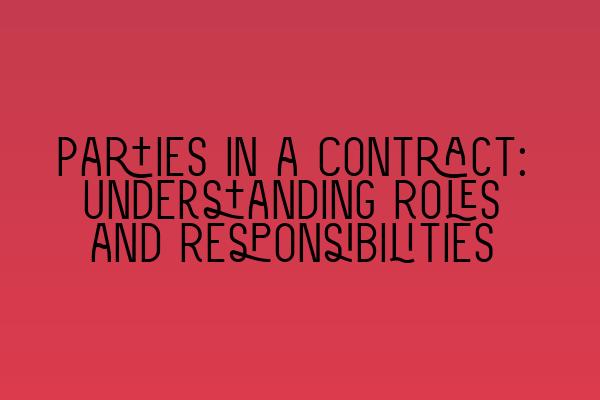Parties in a Contract: Understanding Roles and Responsibilities
In the world of contract law, it is essential to have a clear understanding of the roles and responsibilities of the parties involved. Contracts are legally binding agreements that establish the rights and obligations of the individuals or entities entering into the agreement. Whether you are a solicitor, business owner, or someone entering into a contract, it is vital to be aware of the various roles and responsibilities to ensure a smooth and successful contractual relationship.
In this blog post, we will explore the different parties typically involved in a contract, their respective roles and responsibilities, and the importance of understanding these dynamics. So, let’s dive in!
1. Parties Involved in a Contract
a. The Offeror
The offeror is the party who initiates the contract by making an offer to another party. They are responsible for clearly stating their intentions and the terms of the agreement. The offeror is crucial in setting the initial terms that will be negotiated and accepted by the offeree.
b. The Offeree
The offeree is the party to whom the offer is made. They have the option to accept or reject the offer presented by the offeror. If the offeree chooses to accept the offer, they become bound by the terms and conditions outlined in the contract.
c. The Promisor
The promisor is the party who makes a promise or undertakes an obligation in the contract. They are responsible for fulfilling their commitments as stated in the agreement. The promisor’s performance is typically vital for the successful completion of the contract.
d. The Promisee
The promisee is the party to whom the promise is made. They have the right to expect the promisor to fulfill their obligations as outlined in the contract. The promisee relies on the promises of the other party and may take certain actions based on these assurances.
2. Roles and Responsibilities
a. Fulfillment of Obligations
Each party in a contract has a specific set of obligations they must fulfill. These obligations may include providing goods or services, making payments, or meeting certain deadlines. It is crucial for all parties to understand their responsibilities and ensure they can meet their obligations as agreed upon.
b. Communication and Cooperation
Clear and effective communication is vital in contract law. Parties should maintain open lines of communication and keep each other informed of any developments or changes that may affect the contract. Cooperation between the parties is essential to ensure a collaborative and successful contractual relationship.
c. Compliance with Legal and Ethical Standards
All parties involved in a contract must adhere to legal and ethical standards. Unlawful or unethical behavior can result in legal consequences and damage the reputation of the parties involved. It is the responsibility of each party to act in good faith and comply with all applicable laws and regulations.
d. Dispute Resolution
In the event of a dispute or disagreement, the parties should attempt to resolve the issue amicably. It is advisable to include a dispute resolution clause in the contract to outline the procedures for resolving disputes, such as negotiation, mediation, or arbitration. This clause can save time, costs, and potential damage to the contractual relationship.
e. Termination and Remedies
The contract should specify the conditions under which either party can terminate the agreement. It is essential to understand the provisions related to termination and the available remedies in case of breach or non-performance. Seeking legal advice from a solicitor can help ensure that both parties are aware of their rights and obligations in such situations.
3. Importance of Understanding Roles and Responsibilities
Understanding the roles and responsibilities of the parties in a contract is crucial for several reasons:
a. Clarity and Avoidance of Misunderstandings
Clear understanding of roles and responsibilities helps avoid misunderstandings and misinterpretations. By clearly defining expectations and obligations, all parties can operate on the same page, minimizing the potential for conflicts or disputes.
b. Compliance with Legal and Regulatory Requirements
Understanding the roles and responsibilities ensures compliance with legal and regulatory requirements. Parties can avoid legal pitfalls or violations by understanding their obligations and taking appropriate actions.
c. Establishing Trust and Accountability
A thorough understanding of roles and responsibilities promotes trust and accountability among the parties involved. When each party knows what is expected of them, they can build trust by fulfilling their obligations and being accountable for their actions.
d. Mitigation of Risks
By understanding their roles and responsibilities, parties can identify and mitigate potential risks. They can take proactive steps to address any issues or challenges that may arise during the contractual relationship.
In conclusion, understanding the roles and responsibilities of the parties in a contract is essential for a successful and harmonious contractual relationship. From the offeror and offeree to the promisor and promisee, each party plays a critical role in the fulfillment of contractual obligations. By clarifying expectations, communicating effectively, and complying with legal standards, parties can foster a positive and fruitful contractual relationship.
If you’re interested in learning more about the legal profession, mentorship opportunities, legal challenges, work-life balance, or the Solicitors Qualifying Examination (SQE), check out our related articles below:
– Mentoring for Aspiring Solicitors: Nurturing Talent in the Legal Field
– Legal Challenges and Pitfalls: Navigating the Complexities of the Legal System
– Striking a Balance: Work-Life Harmony in the Legal Field
– Demystifying the Solicitors Qualifying Examination (SQE): What You Need to Know
– Embracing Diversity: Advancing Inclusivity in the Legal Profession
For expert legal advice and assistance, contact SQE Contract Law, your trusted partner in contract law matters.
